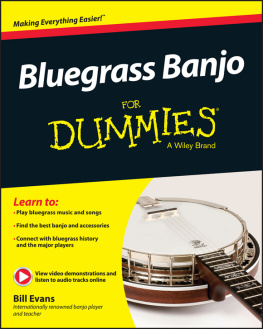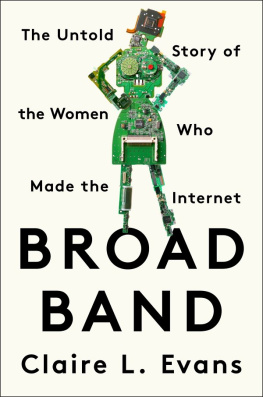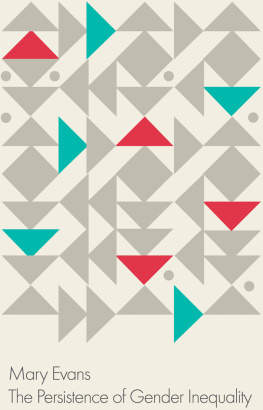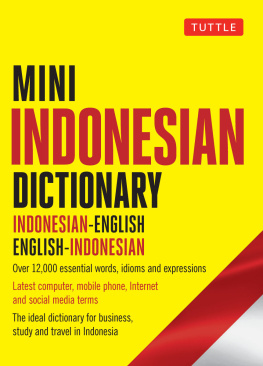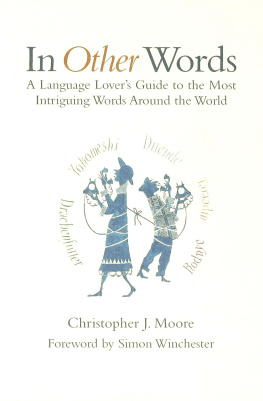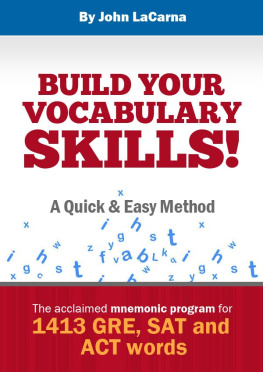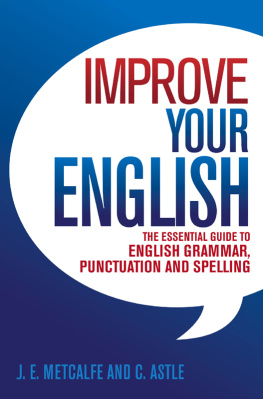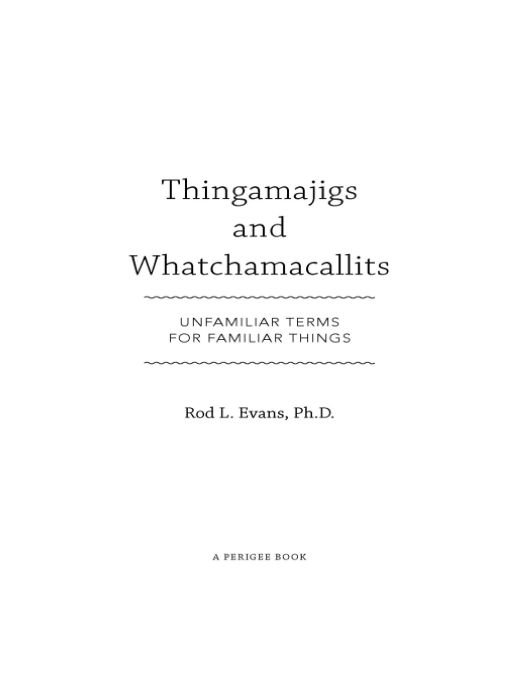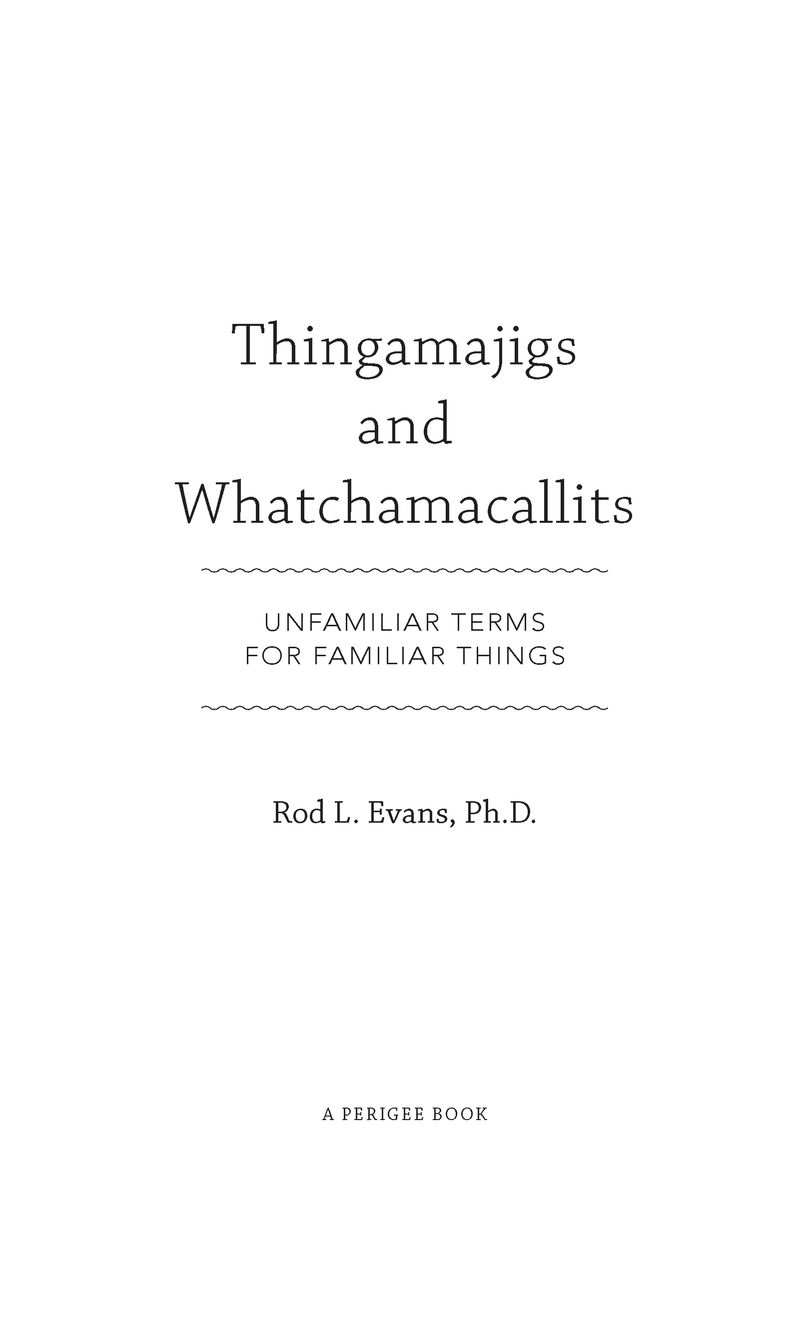Table of Contents
ACKNOWLEDGMENTS
My deep thanks go to my literary agents, Sheree Bykofsky and Janet Rosen; my excellent editor at Perigee, Meg Leder; the talented freelance copyeditor, Candace Levy; my friends Rob Stewart and Justin Gruver, who helped edit the typescript; and my good friend and extraordinary administrative assistant, known for her extraordinary word-processing skills, Robin Hudgins. This book has been enriched by the hard work of many people. I am grateful.
INTRODUCTION
We English speakers are heirs to a rich treasure, a language that has so freely borrowed from other languages as to contain more than one million words. Did you ever wonder, for example, what the plastic tips at the end of shoelaces are called? Theyre aglets. How about the wiggly lines in comic strips to indicate something that is moving? Theyre agitrons. This dictionary contains unfamiliar but technically correct terms for whatchamacallits, doohickeys, and thingamajigs. Nearly every entry is in at least one unabridged dictionary, though a handful of the entries are recent slang (such as Googlegnger, a person who you have found out through a Google search has your same name).
This book is devoted to giving the technically correct though usually unfamiliar words for familiar things. Sometimes its entries are obscure, such as diastema (the gap between Madonnas two front teeth) and philtrum (the vertical indentation between the upper lip and the nose). At other times, what is obscure is not so much the entry itself as one of its meanings, as when the word saddle describes the upper hinge of a matchbook, or when the word crown describes the horizontal part of a paper staple.
The entries in this dictionary include not only unfamiliar words for familiar physical objects but also unfamiliar words for familiar ideas, beliefs, and practices. Accordingly, youll find theodicy, describing the theological enterprise of attempting to vindicate a belief in God and Gods goodness in the face of evil. Similarly, the book contains psilanthropist, describing a person who doesnt believe in Jesus divinity. Presumably, nearly all psilanthropists are unaware that they have a special name, the main component of which literally means merely human.
Although many people know that the glass protecting a salad bar is a sneeze guard, fewer people know that the horizontal bars that lock and unlock exit doors are sometimes called panic bars, or that the dependent class (if clause) in conditional sentences is called a protasis, as in My medical insurance premiums will rise if the 2010 medical reform passed by Congress isnt repealed or declared unconstitutional.
A Note About Organization
The entries are arranged alphabetically under subjects, such as Anatomy, Clothing, and Eyewear.
A Note About the Definitions
Sometimes the entries will contain more than one definition. More often, the entries will contain only one definition, either the most popular or the one that is most interesting, at least according to the author.
A Note About Parts of Speech
Note that most of the entries are nouns (indicated by n.) or adjectives (adj.), though some are verbs (v. or imp. for imperative) or adverbs (adv.). Most of the entries belong to only one part of speech, but some can function as, say, nouns or verbs. Because many of the entries carry multiple meanings, it is possible that this dictionary contains the most popular meaning of a term when it occurs as a noun or a verb but does not contain other meanings of that term when it functions in other parts of speech. The sentence illustrating the meaning will use the word according to the part of speech ascribed to it in the dictionary.
A Note About Word Origins
The dictionary contains a brief explanation of the meanings and origins of the roots of words, not a complete etymological analysis. When a word can be traced through several languages, often only the oldest source will be listed, especially when that source is Greek or Latin.
A Note About Pronunciation
Pronunciations are provided for words that may give people difficulty but not for words whose pronunciations are obvious.
Pronunciation Key
VOWEL SOUNDS
A, apat, pack, mass
AH, ahspa, father, pod
AHR, ahrcar, mar, farm
AIR, airpair, rare, bear
AY, aypay, wait, fame
AW, awraw, mall, walk
E, eyes, bet, pep
EE, eesee, meat, pea
EER, eerear, beer, near
I, iin, pit, nip
Y, y and EYE, eyemy, rice, pie
Note: Y is used in combination with other letters to form a syllable: RYT-lee (rightly). EYE is used when this sound by itself forms a syllable: EYELAND (island).
OH, ohtow, sew, moat
OO, ooto, booze, mule
OR, orcore, poor, war
OOR, oortour, lure, pure
OY, oyoil, coin, soy
UH, uhpup, dull, sum
UU, uupull, wood, could
CONSONANT SOUNDS
B, bball, cob, bubble
CH, chchap, patch, reach
D, ddig, dad, mud
F, ffit, affect, laugh
G, ggot, rig, Gus
H, hhat, hop, hint
J, jjob, magic, cage
K, kkind, cup, rake
L, lleg, also, fell
lbattle, apple, turtle
M, mmug, drum, gem
mchasm, prism, sarcasm
N, nno, knap, bend
nrotten, hidden, treason
NG, ngring, anger, sank
P, ppop, pepper, pin
R, rrag, large, mar
S, ssat, mask, gas
SH, shshe, bush, notion
T, ttip, butter, mist
TH, ththin, nothing, thirst
TH, th their, this, mother
V, vvet, Steve, give
W, wwell, wave, flower
Y, yyet, you, layer
Note: (Y), (y) indicates that some speakers employ the Y sound of you and others do not: N(Y)OO (new); D(Y)OO-tee (duty); uh-ST(Y)OOT (astute)
Z, zzoo, glaze, please
STRESS/ACCENT
Syllables are separated by a hyphen (-).
Syllables printed in CAPITAL letters are stressed.
Syllables printed in small (lowercase) letters are not stressed.
Words of one syllable are printed in CAPITAL letters.
Words of more than two syllables that have primary and secondary stress are transcribed in the following manner: The syllable with secondary stress is printed in CAPITALS, and the syllable with primary stress is printed in BOLDFACE CAPITALS: AHK-tuh-THORP (octothorpe).
ANATOMY
ALAE (AY-lee): n. from Latin ala (wing, armpit, side apartment): the fleshy bulbs on each side of the nose.
Everything about W. C. Fieldss body was bulbous, including the alae of his nose.
ANORCHOUS (an-ORK-us): adj. from Greek anorchos, from Greek an- (without) and orchis (testicle): without testicles.
Eunuchs have been trusted around mens wives because anorchous men are often unthreatening.
AXILLARY (AK-suh-LAIR-ee): n. from Latin axilla (armpit, crotch): pertaining to the armpit.
Because of Melvins axillary odor, we asked him to use an antiperspirant.
CALLIPYGIAN (KAL-i-PIJ-ee-in): adj. from Greek kallipygos , from kalli- (beautiful) and pyg (buttocks): having shapely buttocks.



